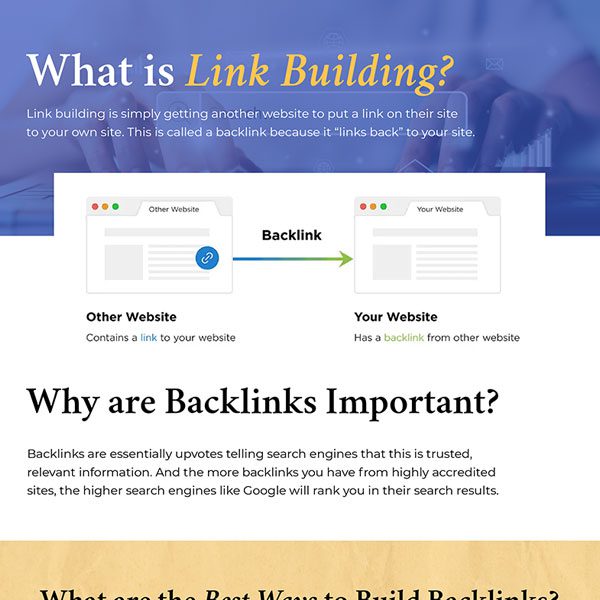Are you tired of hearing about SEO but not really understanding what it requires?
In this article, we will demystify SEO and provide you with an understanding straight from a leading SEO consultant. Whether you’re a business owner seeking answers or a digital marketing aficionado eager to elevate your skills, this is the guide you’ve been searching for.
From uncovering the perfect keywords to optimizing your pages, we’ve got every aspect covered. Brace yourself as we launch your website to the pinnacle of organic traffic. It’s time to unlock the true power of SEO and witness your online visibility skyrocket like never before!
Let’s Discuss Your SEO Goals
The Importance of SEO for Businesses
One of the most outstanding advantages of SEO lies in its cost-effectiveness. Unlike traditional advertising channels such as print or television, SEO allows you to target specific keywords, enabling precise reach to an audience that is receptive to your offerings. This approach enhances the likelihood of attracting quality leads but also maximizes your return on investment.
Through consistent optimization of your website and attention to the latest SEO trends, you can maintain strong rankings and continually entice organic traffic.
Building trust and credibility is another compelling reason why you must prioritize SEO campaign management. Securing a listing on the first page of search engines instills in users a perception of trustworthiness and authority in your brand.
Search engines employ a multifaceted ranking process that includes content quality, relevance, user experience, and backlinks. By actively optimizing critical elements, you can establish your brand as an industry leader.
Common Misconceptions About SEO
SEO, like many complex topics, is filled with misconceptions and myths. Let’s debunk some of the most common ones to clear up what SEO entails and what it does not.
One of the biggest misconceptions is that SEO is a one-time task. A set it and forget it. In reality, SEO is an ongoing process that requires continuous effort and work. Search engines regularly update their algorithms and your competition is vying for top rankings. To maintain a compeitive edge, you must regularly monitor and adjust your SEO strategies.
Another complex misconception lies around keywords. Add too many and your rankings will suffer. Don’t add enough and you won’t rank.
Here’s a high-level guide on keywords:
- One focus keyword per page
- Focus keyword should be in the URL
- Focus keyword should be in the intro of the content
- Keyword density should be at most 1% of the content or used 3-6 times in a 500-word article, 5-10 times in a 1,000-word article
- Focus keyword should be in subheading tags
- Do not link focus keyword on the page
SEO vs. SEM: Understanding the Difference
When it comes to digital marketing, two terms are often used together; SEO and SEM (search engine marketing). Although both aim to enhance your website’s visibility, there are notable distinctions between the two.
As mentioned, SEO focuses on achieving organic rankings and search results pages by using keywords, optimizing and link building. The objective is to attract traffic without directly paying search engines.
On the flip side, SEM entails paid ads on search engines, commonly referred to as Pay-Per-Click (PPC) [INT LINK]. Website join in keyword bidding and making payments each time their ad is clicked.
While SEO is the long-play, SEM yields immediate resutls. However, it can be much more expensive, especially for highly competitive keywords.
The decision to choose between SEO and SEM depends on your business objectives, budget, and timeline.
The Role of Keywords in SEO
Keywords serve as the building blocks of SEO. They represent the words or phrases that users input into search engines when seeking answers, products, or services. By understanding the keywords used by your audience, you can optimize your content to appear at the top of search results.
Conducting keyword research is the most important step in your SEO strategy. It involves identifying keywords that are relevant to your business. Various tools like Google Keyword Planner and Ahrefs are available to assist you in discovering keywords and analyzing their search volume, competition, and difficulty.
The next step is to strategically incorporate your keywords into your website’s content. This can involve optimizing page titles, headings, meta descriptions, and content. However, it is crucial to strike a balance and avoid excessive keyword usage, as search engines can penalize websites that engage in this.
Additionally, in addition to conventional keywords, considering long-tail keywords or questions. Long-tail keywords are lengthier and more specific phrases. By targeting long-tail keywords, you can attract highly relevant traffic and enhance the likelihood of conversions.
On-page Optimization Techniques
On-page optimization are the methods used to enhance the search engine rankings from the website’s content and code. This entails optimizing various components, such as content, HTML tags, and URLs.
A significant aspect of on-page optimization involves optimizing page titles and meta data. These elements are visible on search results pages and have a great impact on click-through rates. By including targeted keywords and compelling descriptions, you can entice users to click on your website.
Furthermore, URL structure plays a role in on-page optimization. It is crucial to have descriptive and keyword-rich URLs that accurately depict the content of the page. This helps search engines in understanding the context of your page and enhances its visibility.
Off-page Optimization Strategies
While on-page optimization focuses on adjusting elements on your website, off-page optimization involves implementing external strategies to your website.
One crucial strategy in off-page optimization is link building. Link building which involves acquiring backlinks from other websites to your own. Backlinks are viewed as endorsements and can enhance your website’s authority.
However, as always, quality over quantity. High-quality and relevant backlinks from reputable websites hold more value than a large quantity of low-quality backlinks.
Social media marketing is another off-page optimization strategy that can elevate your website’s visibility. Being active with your audience on social media, you can increase brand awareness, traffic, and potentially earn backlinks. Social signals like likes, shares, and comments can indirectly influence your search engine rankings.
Furthermore, online directories and local citations play a significant role in off-page optimization, particularly for businesses with a physical presence. Listing your business on respected directories like Google Business Profile and Yelp can enhance your local search visibility and attract customers in your area.
The Impact of User Experience on SEO
In recent years, user experience (UX) has become a big ranking factor in search algorithms. Search engines strive to deliver optimal results to users, and a positive user experience plays a pivotal role.
One aspect of UX that search engines take into account is the speed at which pages load. Websites that load slowly can lead to user frustration and high bounce rates.
To enhance your website’s load times, you should optimize images, minimize CSS and JavaScript files, and employ caching plugins or techniques.
The navigation and structure of your website are also significant factors for user experience. A well-organized and intuitive navigation system aids users in finding the information they seek. Having clear and descriptive headings, a logical page hierarchy, and internal linking is important for guiding users throughout your website.
Furthermore, incorporating engaging and interactive elements like videos, infographics, and quizzes can enhance user experience and increase the time spent on your website. These elements not only provide value to users but also help reduce bounce rates.
Choosing the Right SEO Consultant for Your Business
When it comes to SEO, a knowledgeable consultant can have a huge impact. Here are four things to keep in mind when choosing the right SEO consultant for your business:
- Expertise: Seek out a consultant with a great track record. They should possess a profound understanding of SEO best practices and remain updated on the latest trends and algorithm changes.
- Ethical practices: Using black hat techniques can result in search engine penalties. An SEO consultant should be transparent about their strategies and provide regular progress reports on your SEO campaign.
- Approach: A one-size-fits-all SEO approach may not provide your business with optimal results. A good SEO consultant will invest time in comprehending your business goals and competition. Tailored strategies according to with your goals is what you want to look for.
- Communication: SEO consultants should be accessible, responsive, and willing to join forces with your team to accomplish your SEO objectives.
Conclusion
Although SEO may appear intricate and daunting, the knowledge of employing effective strategies can unlock your website’s potential.
By understanding the significance of SEO for businesses and implementing optimization techniques, you can drive organic traffic through the roof.
It is crucial to remain updated on the always moving SEO trends so collaborate with a seasoned SEO consultant to optimize your outcomes. It is time to demystify SEO and propel your website goals.



